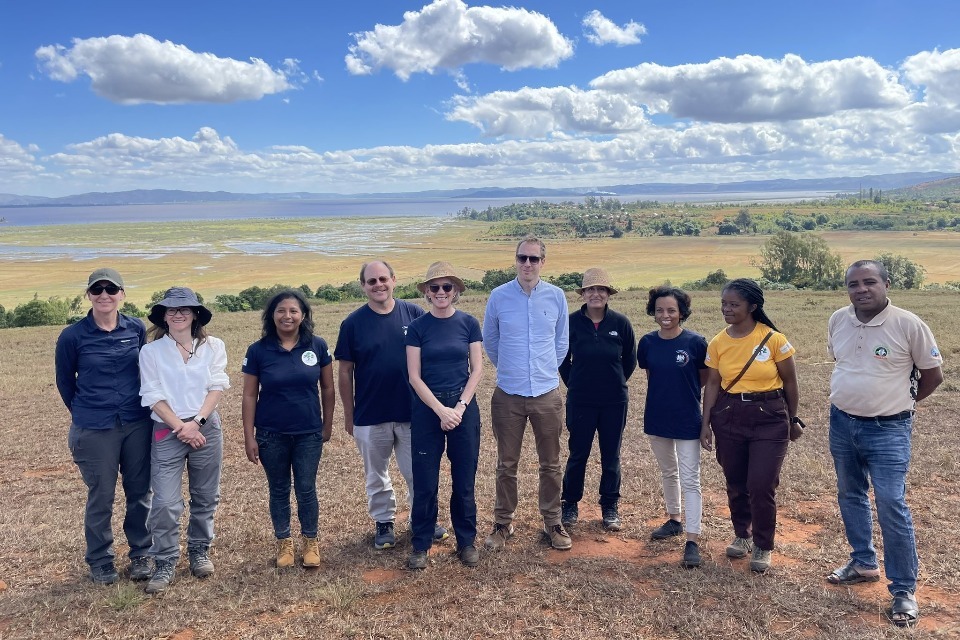Government Chief Scientific Adviser visits Madagascar

The Government Chief Scientific Adviser (GCSA) Professor Dame Angela McLean has visited Madagascar to learn how the UK is supporting the Malagasy government and people to protect this biodiversity hotspot.
The GCSA accompanied a delegation from the Department for Environment, Food and Rural Affairs (Defra), which was visiting Madagascar to review the Defra-funded projects in Madagascar, and have discussions with the Malagasy Minister for Environment and Sustainable Development, Max Fontaine, and the Minister of Fisheries and Blue Economy, Paubert Mahatante Tsimanaoraty. They were accompanied by the UK Ambassador to Madagascar, David Ashley.
Defra is funding more than 30 projects in Madagascar, empowering communities, government and scientists to protect biodiversity, reduce poverty and address climate change. Major programmes include the Biodiverse Landscape Fund, Blue Planet Fund, Darwin Initiative, Illegal Wildlife Trade Challenge Fund, and the Global Centre on Biodiversity for Climate.
To understand the impact of this investment, the GCSA and Defra delegation travelled to the Alaotra-Mangoro region in eastern Madagascar. In this region, a Malagasy NGO, Madagasikara Voakajy (MV), is using UK funding to support remote villages around Analalava and Mangabe protected areas to build more sustainable livelihoods and reduce reliance on the forests.
Dame Angela and her Defra colleagues saw how local communities are using improved, home-made stoves, which are cleaner, safer and more efficient. They saw how villagers are adopting scientifically-tested agro-forestry techniques, with MV’s support. They were inspired too by meeting young people living around the protected areas who have been become passionate conservation ambassadors thanks to an MV project funded by the Darwin Initiative.
To conclude the visit, the GCSA and Defra representatives met with Defra’s partners in Madagascar during a workshop to enhance cooperation and share best practices, including on the use of science to improve and monitor impact.
Speaking about the visit, Dame Angela McLean said:
“Madagascar has some of the highest levels of endemism on the planet, with more than 90% of its species found nowhere else. This includes 100 species of lemur, as well as many unique birds, amphibians, reptiles, fish, invertebrates and plants. I was thrilled to be in Madagascar and see how the UK is supporting the Malagasy government and people to protect this biodiversity hotspot.”
Ambassador Ashley said: “Madagascar, the world’s fourth biggest island, contains far more endangered species than any other country on earth. Conserving its unique flora and fauna means supporting the development of the communities who live alongside them. And that means deploying cutting-edge science to use limited resources, including from the UK, to maximum effect.
“I am very grateful to the British Government’s Chief Scientific Adviser and senior colleagues from Defra for their willingness to travel long distances to and within Madagascar in order to hear from people on the frontline of conservation about what’s working and what is still needed, in order to halt and reverse biodiversity loss, tackle the effects of climate change and address poverty.”
Find out more about the UK-Madagascar development partnership here and see the highlights from the visit here.
Related
Calls for over 60 free bus travel update from Department…
Calls for free bus travel for those over the age of 60 in England is gaining more attention after an increase of support. Unlike those in Wales, Scotland, and N
Major UK train station is one of the worst places…
Pickpockets are a problem across the UK, but one place is the worst for having your belongings stolen. According to the British Transport Police (BTP), just und
UK Snow Travel Chaos: Kent, East Sussex, West Sussex, Hampshire,…
UK Snow Travel Chaos: Kent, East Sussex, West Sussex, Hampshire, Wiltshire, Surrey, Berkshire, Greater London, Essex, Suffolk, Hertfordshire,
‘Only travel if necessary’ warning as UK’s busiest motorway shut…
NATIONAL Highways have issued an urgent warning to drivers as one the UK's biggest motorways shuts for the weekend. They has urged drivers to re-plan their rou











